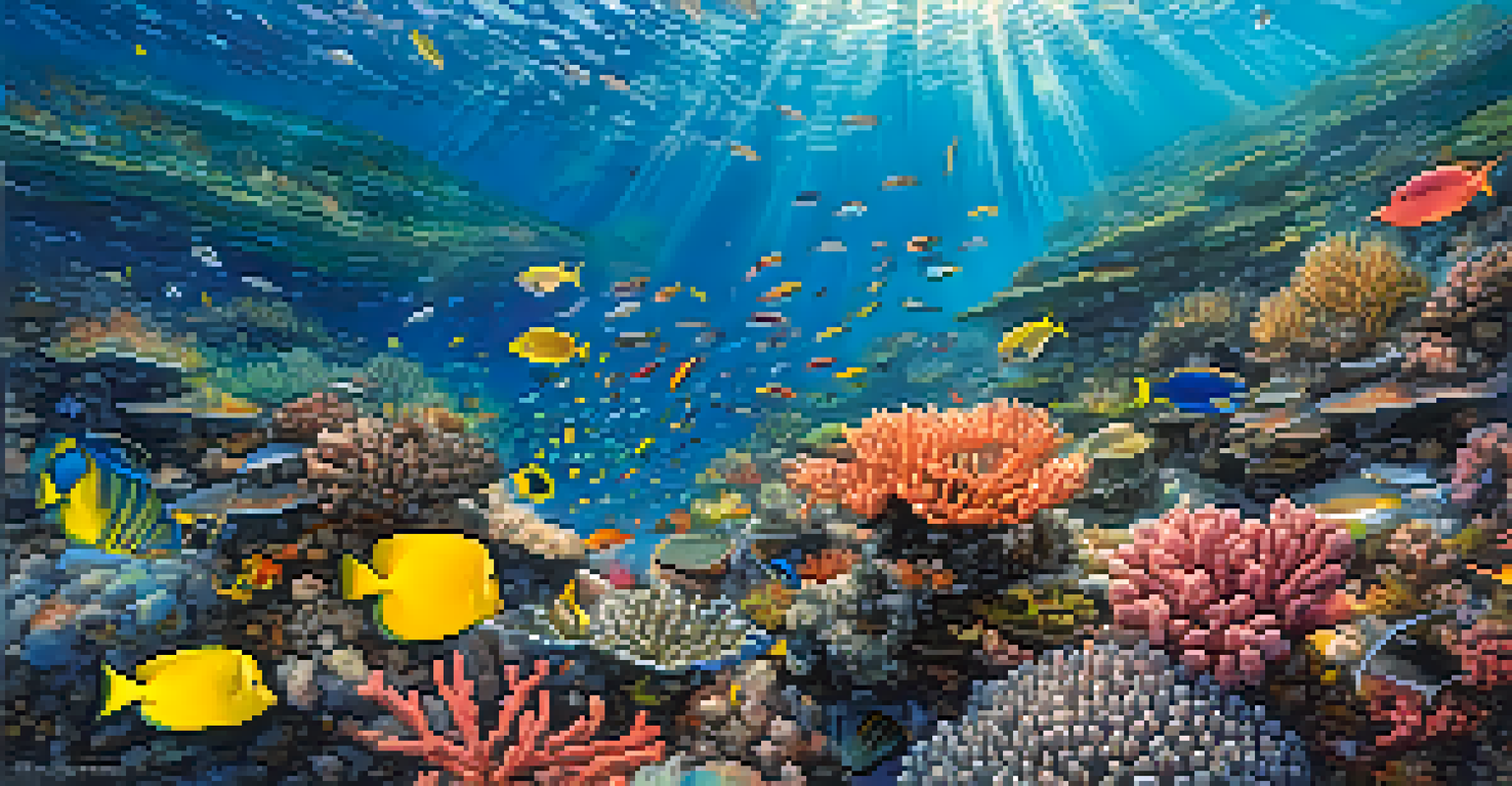Political Influence: Hawaii's Role in Pacific Island Governance

Introduction to Hawaii's Strategic Influence in the Pacific
Hawaii's geographical location in the central Pacific makes it a pivotal hub for governance among Pacific Island nations. With a unique blend of cultural heritage and modern political influence, Hawaii plays a crucial role in regional diplomacy. This blend not only enhances Hawaii's standing but also fosters a sense of unity among the islands.
The Pacific is a vast ocean of opportunity and responsibility, and Hawaii stands at the crossroads of both.
The state's diverse population, which includes a significant number of Pacific Islanders, adds to its rich cultural tapestry. This diversity enables Hawaii to engage in meaningful dialogue with various Pacific nations, enhancing its ability to influence regional policies. As a result, Hawaii serves as a bridge between the United States and its Pacific neighbors, facilitating collaboration and mutual understanding.
Furthermore, Hawaii's historical ties to these islands, dating back centuries, strengthen its political influence. These connections provide a deep-rooted understanding of local issues, allowing Hawaii to advocate effectively for Pacific Island interests on the global stage.
Hawaii's Diplomatic Initiatives and Collaborations
Over the years, Hawaii has engaged in various diplomatic initiatives aimed at fostering cooperation in the Pacific region. One notable example is the East-West Center, which promotes understanding and relationships among the U.S. and Pacific nations through research and education. This initiative has helped to cultivate a network of leaders across the islands, enhancing collaborative efforts.

Another key platform is the Hawaii-based Pacific Islands Forum, which brings together leaders to discuss pressing issues such as climate change, security, and sustainable development. These discussions are vital for collective decision-making, allowing Hawaii to lead in shaping regional policies that affect all Pacific nations.
Hawaii as a Pacific Diplomatic Hub
Hawaii's strategic location and cultural diversity enhance its role in regional diplomacy and collaboration among Pacific Island nations.
Moreover, Hawaii's participation in international conferences and summits further amplifies its voice. By advocating for sustainable practices and the protection of ocean resources, Hawaii positions itself as a leader in addressing challenges faced by Pacific Island nations.
Cultural Diplomacy: A Key to Political Influence
Cultural diplomacy is another significant aspect of Hawaii's political influence in the Pacific. Through cultural exchanges, Hawaii fosters goodwill and mutual respect among Pacific Island nations. Events celebrating traditional arts, music, and cuisine create opportunities for dialogue and strengthen relationships.
Cultural exchange is not just about sharing; it's about building connections that transcend borders.
For instance, the annual Aloha Festivals not only celebrate Hawaiian culture but also invite participation from other Pacific nations. This inclusivity helps to showcase the shared values and traditions of the region, promoting a sense of unity.
By leveraging its cultural heritage, Hawaii effectively enhances its diplomatic efforts. This approach not only reinforces Hawaii's influence but also emphasizes the importance of cultural identity in governance.
Economic Partnerships and Their Political Implications
Economic partnerships are vital for political influence in the Pacific, and Hawaii plays a crucial role in fostering these relationships. Trade agreements and investment initiatives between Hawaii and other Pacific nations have significant implications for regional governance. Such partnerships enhance economic stability and create opportunities for collaboration.
The tourism industry, which thrives in Hawaii, also serves as a model for economic development in other Pacific islands. By sharing best practices and resources, Hawaii helps neighboring nations boost their economies while promoting sustainable tourism.
Cultural Diplomacy Strengthens Ties
Through cultural exchanges and events, Hawaii fosters goodwill and unity among Pacific nations, reinforcing its political influence.
These economic ties not only strengthen Hawaii's position but also empower other Pacific nations. As economies grow, so does their capacity for self-governance and political influence within the region.
Environmental Leadership: Hawaii's Role in Pacific Issues
Environmental challenges such as climate change and ocean conservation are critical issues for Pacific Island nations, and Hawaii has positioned itself as a leader in these areas. Through initiatives like the Hawaii Green Growth initiative, the state advocates for sustainable practices that benefit both local and regional ecosystems. This leadership role enhances Hawaii's influence in discussions about environmental governance.
Hawaii's commitment to renewable energy and conservation efforts serves as an example for other Pacific nations grappling with similar issues. By sharing its experiences and knowledge, Hawaii encourages collaborative approaches to environmental challenges, fostering a sense of shared responsibility.
Moreover, Hawaii's participation in global environmental summits amplifies its voice on the international stage. These efforts not only address local concerns but also contribute significantly to the Pacific region's overall governance and resilience.
Challenges Facing Hawaii in Pacific Governance
Despite its influential role, Hawaii faces challenges in its governance efforts within the Pacific. One pressing issue is the need for a unified voice among Pacific Island nations, which can sometimes be fragmented due to differing priorities and interests. This disunity can complicate Hawaii's diplomatic initiatives and hinder effective collaboration.
Additionally, the impacts of climate change present significant obstacles. As rising sea levels and extreme weather events threaten Pacific nations, the urgency for collective action grows. Hawaii must navigate these challenges while advocating for sustainable solutions that benefit all.
Environmental Leadership in Governance
Hawaii leads in addressing environmental challenges, advocating for sustainable practices that benefit both local and regional ecosystems.
Lastly, political dynamics within the U.S. can also influence Hawaii's role in Pacific governance. Changes in federal policies and funding can affect Hawaii's ability to engage effectively with its neighbors, highlighting the need for consistent support and commitment to regional initiatives.
The Future of Hawaii's Influence in Pacific Governance
Looking ahead, Hawaii's influence in Pacific governance is poised to evolve as new challenges and opportunities arise. The increasing recognition of the importance of regional cooperation will likely enhance Hawaii's role as a facilitator of dialogue and collaboration. By continuing to champion sustainable practices and cultural diplomacy, Hawaii can strengthen its position in the Pacific.
Moreover, as younger generations of Pacific leaders emerge, Hawaii has the chance to mentor and guide them in navigating complex governance issues. This mentorship could foster a new era of collaboration that prioritizes shared goals and collective well-being.

Ultimately, Hawaii's future influence will depend on its ability to adapt to changing circumstances and maintain strong relationships with its Pacific neighbors. By staying committed to its values of unity, sustainability, and respect, Hawaii can continue to play a vital role in shaping governance in the Pacific.